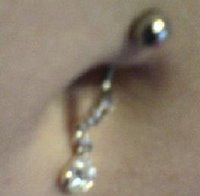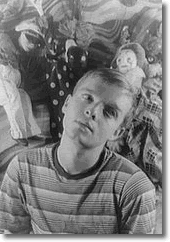 The other night I heard that David Foster Wallace, Adonis of the written word, would be reading in the Haight, so I fixed my hair, slipped into a slit skirt, grabbed a couple of books for him to sign, and I was off.
The other night I heard that David Foster Wallace, Adonis of the written word, would be reading in the Haight, so I fixed my hair, slipped into a slit skirt, grabbed a couple of books for him to sign, and I was off.
Because I spent so much time agonizing over which bra to wear (you never know), I arrived a mere half hour early and all seats were taken. Though my skirt was skin-tight, I managed to sit on the floor without a) falling into someone's lap b) flashing anyone. I clutched my new Garner's usage dictionary and my copy of Wallace's Consider the Lobster.
Twenty minutes to go and someone tapped my shoulder. I looked up, and attached to that tapping finger was ultrababe David Foster Wallace, his long and lovely hair, those scholarly spectacles, that five o'clock shadow. . . And I'm pretty sure he's been working out, because motherofgod, the t-shirt! He knelt to run his fingers along the spine of my Garner's usage dictionary, and for the first time in my life I was jealous of a book, and then he said in a deep, steady voice, "that's an excellent, excellent resource, you know." Then, get this (by now, everything seemed to be going in slow motion while Barry White played in the background): before disappearing through a side door he swept his fingers through his hair, and I swear that in his wake lingered the smell of wool, ocean air, and libraries.
I can't say what happened in the interim between the hair-sweeping incident and the moment he so gracefully ascended the stairs to the stage (and readers, I won't even try to describe the way he filled out his jeans). I may have been unconscious. But I came to in time to hear Mr. Wallace inviting everyone who was sitting on the floor to move up to the front, near the stage. Which I did, and I listened, rapt, while he read "The View From Mrs. Thompson's," an essay about witnessing the events of 911 unfold on TV while sitting in a neighbor's crowded living room. One sentence, in particular, struck me:
[The] thing about [. . .] hay fever is that you can't ever be totally sure someone's crying, but over the two hours of first-run Horror, with bonus reports of the crash in PA and Bush being moved into an SAC bunker and a car bomb that's gone off in Chicago (the latter then retracted), pretty much everybody either cries or comes very close, according to his or her relative abilities. [Lobster, 138]
After the reading I asked David Foster Wallace what he meant by the final word, "abilities," in that quote; I privately wondered if he was referring to "the ability to hold back tears," or "the ability to weep?" The answer, I thought, would provide me with an even deeper insight into David who, I'd pretty much decided, was my soul mate; we both read usage dictionaries cover-to-cover, after all. And as I mentioned, those pectorals of his. . .
His answer was long and surprising and to be honest tedious and addressed the idea that watching the events of 911 unfold on television is highly ironic because one can't help wondering how much of it is staged, so it's difficult to cry without feeling stupid when one is so detached from blah-bitty blah blah blah.

Which, okay, do we have to intellectualize even those things that might move us deeply? By doing so aren't we purposely distancing ourselves in order to sort of "step" on them, and further to use this new and elevated position as a vantage for pointing out how we are too clever to simply view a thing on its own level? Can we not be clever without always having to be more-clever-than? Can we ever, in this present world, cry without feeling ashamed? By constantly casting doubt on sincerity aren't we destroying its very possibility?
To be fair, Mr. Wallace's popularity reached its peak in the early nineties, when he was cast as a writer who spoke for the most cynical generation of all. He was live, in person, and on stage, speaking to an audience of generation X-ers who (perhaps) might have come to expect a certain ironic approach. And after having read Mr. Wallace's stories,
1 I don't for a minute believe the defensive posture.
David Foster Wallace, I still love you, but the candle I once burned for you is no longer the brightest.
___________________
1See "Incarnations of Burned Children," and here's an excerpt, just to prove my point: "If you've never wept and want to, have a child."[Oblivion, 116].

 ,
,


















